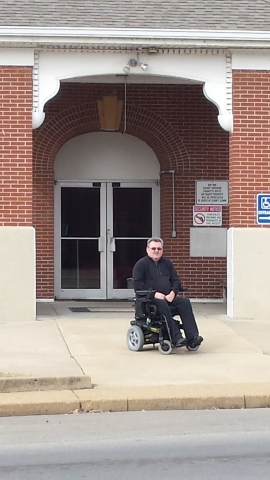Related Content
Press Release
This is archived content from the U.S. Department of Justice website. The information here may be outdated and links may no longer function. Please contact webmaster@usdoj.gov if you have any questions about the archive site.
 Twenty-five years ago, our nation committed itself to the elimination of discrimination against people with disabilities—through the Americans with Disabilities Act (ADA). The U.S. Department of Justice’s Civil Rights Division is proud to play a critical role in enforcing the ADA, working towards a future in which all the doors are open to equality of opportunity, full participation, independent living, integration and economic self-sufficiency for persons with disabilities. In honor of the 25th anniversary of the ADA, each month the Department of Justice will spotlight efforts that are opening gateways to full participation and opportunity for people with disabilities. This month, we spotlight the story of Randy Barron and building access in Washington County, Missouri.
Twenty-five years ago, our nation committed itself to the elimination of discrimination against people with disabilities—through the Americans with Disabilities Act (ADA). The U.S. Department of Justice’s Civil Rights Division is proud to play a critical role in enforcing the ADA, working towards a future in which all the doors are open to equality of opportunity, full participation, independent living, integration and economic self-sufficiency for persons with disabilities. In honor of the 25th anniversary of the ADA, each month the Department of Justice will spotlight efforts that are opening gateways to full participation and opportunity for people with disabilities. This month, we spotlight the story of Randy Barron and building access in Washington County, Missouri.
Randy Barron was excited to apply for a marriage license in Washington County, but he was soon met with obstacles. After Mr. Barron got through the front door of the county building, he found that the ramp going down to the Recorder of Deeds office was too steep for him to safely use his wheelchair. Additionally, there was insufficient room for him to maneuver his wheelchair to a flat surface to reach the door to the office. Barriers to accessibility mean that people like Mr. Barron will not be able to fully benefit from county services and programs, including experiencing the happiest of moments of our lives, like applying for a marriage license.
Over the next three years, experiences like Mr. Barron’s will become a thing of the past. Washington County and the U.S. Department of Justice have reached an agreement under Project Civic Access (PCA), the department’s wide-ranging initiative to ensure that cities, towns and counties throughout the country comply with the Americans with Disabilities Act (ADA). One of the hallmarks of the agreement is the requirement that the county will remove architectural barriers in its buildings, including making entrances accessible.
Mr. Barron has told the department that he’s “happy to know that Washington County will be ensuring the accessibility of its buildings and programs. So many aspects of public life require access to the county’s facilities and services, from paying taxes, to going to court, to getting married.”
Under the agreement, Washington County will also ensure that people with disabilities — especially people who use wheelchairs like Mr. Barron — can get inside buildings that offer county services and programs, and take full advantage of those services and programs. Already, Washington County has installed an elevator to provide access to the upper and lower levels of the courthouse.
Over the past 15 years, nearly 220 communities have signed agreements with the Department of Justice to ensure that their citizens with disabilities enjoy the same services, programs and activities that all others enjoy. For information on how jurisdictions can participate in Project Civic Access, visit www.ada.gov.